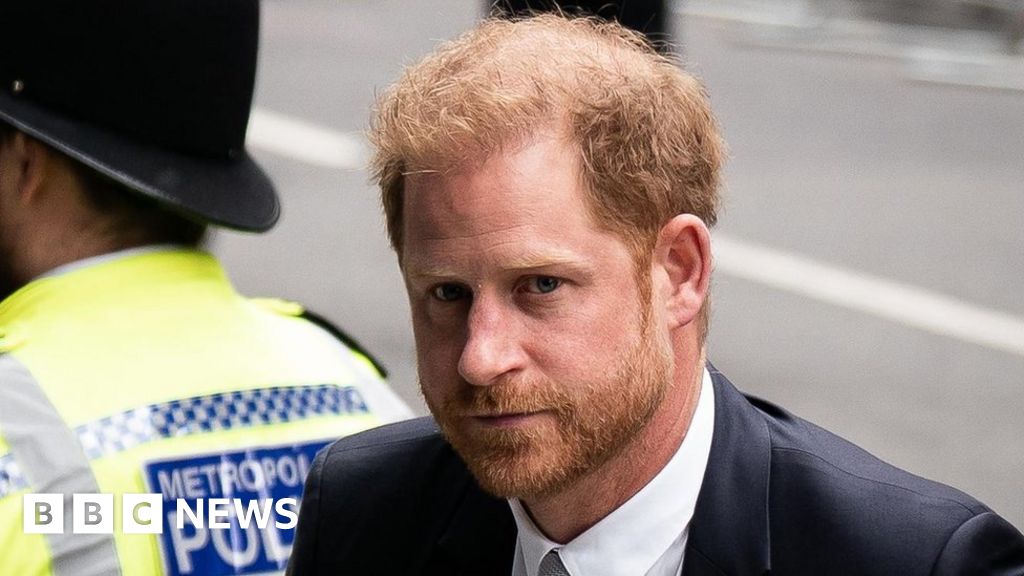Prince Harry is challenging the fairness of how decisions over his security were made
Prince Harry wants his children to “feel at home” in the UK but they cannot if “it’s not possible to keep them safe”, the High Court has heard.
Calling the UK his home, the Duke of Sussex said it was “with great sadness” that he and his wife Meghan “felt forced” to leave the country in 2020.
He is challenging the Home Office over a decision to downgrade his security protection when visiting.
The government says his claim should be dismissed.
The court is considering the changes to publicly-funded protection when Prince Harry stopped being a “working royal” in early 2020. After stepping back he moved to the US, where he lives with his wife and their two children, Archie and Lilibet.
The committee that arranges security for members of the Royal Family and other VIPs – known as Ravec – decided in 2020 that Prince Harry would no longer have the automatic level of security for senior royals.
Instead the level of security would be arranged depending on the perceived risk, as is the case with other high-profile visiting dignitaries.
Prince Harry’s lawyers say the decision was “unlawful and unfair”.
At a hearing on Thursday his barrister, Shaheed Fatima KC, said references by the Home Office’s lawyers to the prince no longer being a full-time working royal were “often said in a way that emphasised choice”.
But she said he did not accept this.
She read out an excerpt of a statement written by Harry as part of his case, in which he said: “It was with great sadness for both of us that my wife and I felt forced to step back from this role and leave the country in 2020.
“The UK is my home. The UK is central to the heritage of my children and a place I want them to feel at home as much as where they live at the moment in the US. That cannot happen if it’s not possible to keep them safe when they are on UK soil.
“I cannot put my wife in danger like that and, given my experiences in life, I am reluctant to unnecessarily put myself in harm’s way too.”
Thursday marks the end of the two-and-a-half day hearing – much of which concerned security arrangements for senior figures and took place in private.
Prince Harry, who did not attend in person, now waits for a ruling from Mr Justice Lane at a later date.
Earlier this week, Prince Harry’s lawyers argued there had been a lack of transparency about the decision and the prince had been not been treated the same way as others.
There was “no good reason for singling out the claimant [Prince Harry] this way,” said his legal team.
Ms Fatima KC told the court: “Ravec should have considered the ‘impact’ a successful attack on the claimant would have, bearing in mind his status, background and profile within the royal family – which he was born into and which he will have for the rest of his life – and his ongoing charity work and service to the public.”
But the Home Office’s case argued that as the prince was no longer a working royal and lived overseas, “his position has materially changed”.
“In those circumstances protective security would not be provided on the same basis as before,” said its lawyers.
There will still be publicly-funded police security for Prince Harry, the lawyers said, but these will be “bespoke arrangements, specifically tailored to him”, rather than the automatic security provided for full-time working royals.
Sir James Eadie KC, for the Home Office, said in written arguments it was “simply incorrect” to suggest that there was no evidence that the issue of impact was considered, adding that the death of Diana, Princess of Wales – Harry’s mother – was raised as part of the decision.

William Turner is a seasoned U.K. correspondent with a deep understanding of domestic affairs. With a passion for British politics and culture, he provides insightful analysis and comprehensive coverage of events within the United Kingdom.








